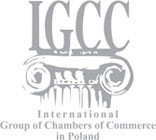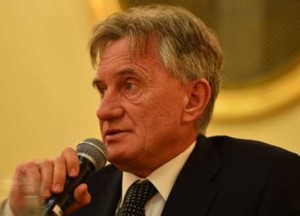Minister of the Environment, Marcin Korolec had been summoned to parliament to vote, so the event was attended by Piotr Woźniak, chief national geologist and under-secretary in the Ministry of the Environment, which focused on Poland’s nascent shale gas industry. The meeting, organized by the 13 chambers that make up the International Group of Chambers of Commerce in Warsaw, was held at the Polonia Palace Hotel on 8 March.
Mr Woźniak set scene regarding shale gas in Poland. “We are still waiting for the results of preliminary exploration. Of the 41 drillings so far, seven have been fractured but only four have gone into horizontal section. The learning curve is still moderate though and although results look promising – at least in the northern and in the east and south-east part of Poland, we still need more drillings to be carried out” he said.
Mr Woźniak spoke of forthcoming changes in the law, under which “both foreign and native country will be treated equally.” Between two limitations – the environmental ones imposed at European level, and the Hydrocarbon Directive – “the changes in the law are intended to keep the sector competitive,” he said, ensuring the “conditions needed to move from exploration to production as fast as possible, to assure security of supply which we suffer from time to time, and to move our power generation industry from coal to a more friendly fuel environment. We still generate nearly 90% of our power from burning coal.”
He outlined the forthcoming legal changes. “Three separate concessions – for prospecting, exploration and production will be combined into just one. You will no longer require a concession for prospecting, and instead of separate concessions for exploration and production – a single concession will cover both.”
Mr Woźniak continued: “I hope this will facilitate businesses which are thinking of doing business in Poland, it offers them full continuity. Licences will only be obtainable by bidding. Anyone today may ask for licence, for any one area. Companies can only participate in bid once it has been announced – like on Denmark, Holland or Norway. There will be three stages of the bidding process Pre-qualification – which will depend upon an assessment of the technical skills and environmental record of the bidding company and its financial capability to carry out the scope of work, will constitute the first stage.. The bidding rounds will be announced one year before the bidding is opened, in a transparent way. The final stage will be entering into a joint operating agreement with the winner of the bidding process,” he said
Mr Woźniak announced that the draft text of the joint operating agreement has already been published; it is available on the ministry’s website [please give precise URL of link]. “The joint operating agreement is important as this will be the first time we have ever implemented the JOA principle.
The winner of the bid will work with NOKE [Narodowy Operator Kopalin Energetycznych – national energy mining operator], which is 100% owned by the state treasury
The purpose is to bring some money to the business to any particular concession and to decrease the financial risk of the business . NOKE will financially participate in profits as a result of the bidding process. This will be interrelated with its participation in the drilling
“The winner of the tender will be the party that offers the best working plan and the highest profit to the state. A very important part of our scheme is one concession per one block, with an unlimited number of companies bidding for the concession. There can be more firms sharing the execution of one concession. Under the current regime, this is not possible. The law is being changed so that we can have more partners.
The concessions will allow for full continuity of business concessions for 30 years. The exploration phase is for five years renewable by one year to a maximum of six. If it turns out there are no proven reserves in the concession area, the winning bidder can relinquish the concession at any time. Another firm can then bid for the same area.
“For existing companies looking for oil or gas in Poland, there are transitional arrangements – all on our website in Polish. http://www.mos.gov.pl/kategoria/195_geologia/ All existing companies may follow the old regime if they wish. Whoever has a prospecting and/or exploration concession may follow the old regime. There will, however, be some slight changes in reporting and monitoring. There will be a special transitional regime. All the companies can ask to enter the new regime and apply for a JOA with NOKE The state reserves the right not to accept a company’s offer to shift to the new regime. Our aim is to keep investors in Poland satisfied”, said Mr Woźniak.
He took the time to answer questions from the floor. When asked about the energy mix he would like to see for Poland moving forward, he replied “We need to diversify. In Germany coal-fired generation is booming again, renewables are in some kind of retreat. The price of power in Poland has been sustained for the past six years, it has slowed down over the past year; with the current energy mix we are paying lower prices for electricity; the chances of an energy mix that would raise prices are limited”.
Replying to a question regarding consultations with the oil and gas industry, he said that there would be “not one but more workshops with the industry. We need a very good lawyer to shape [the legislation]. It has to be equally understood by both sides. We held a workshop two weeks ago, just after the new regime was announced; the next workshop can be any time. We will listen to all organizations”, pledged Mr Woźniak.
There was a question regarding Poland’s power generation capacity. Mr Wożniak replied that the pace of building new capacity is slow. “The missing link is 16,000 GW; the construction of two power blocks has already started. Subsidizing the industry will not help. Renewables are highly subsidized. We need to slow down the rising price of power and keep it at 200zł MW/h for many years. But this is not filling the gap. I would want the market to drive the investment. At lower prices of energy, I don’t want to subsidies or withdraw subsidy from someone. And finally, we have the package of energy regulation in the shape of the so-called ‘three-pack’ which will help define matters.”

